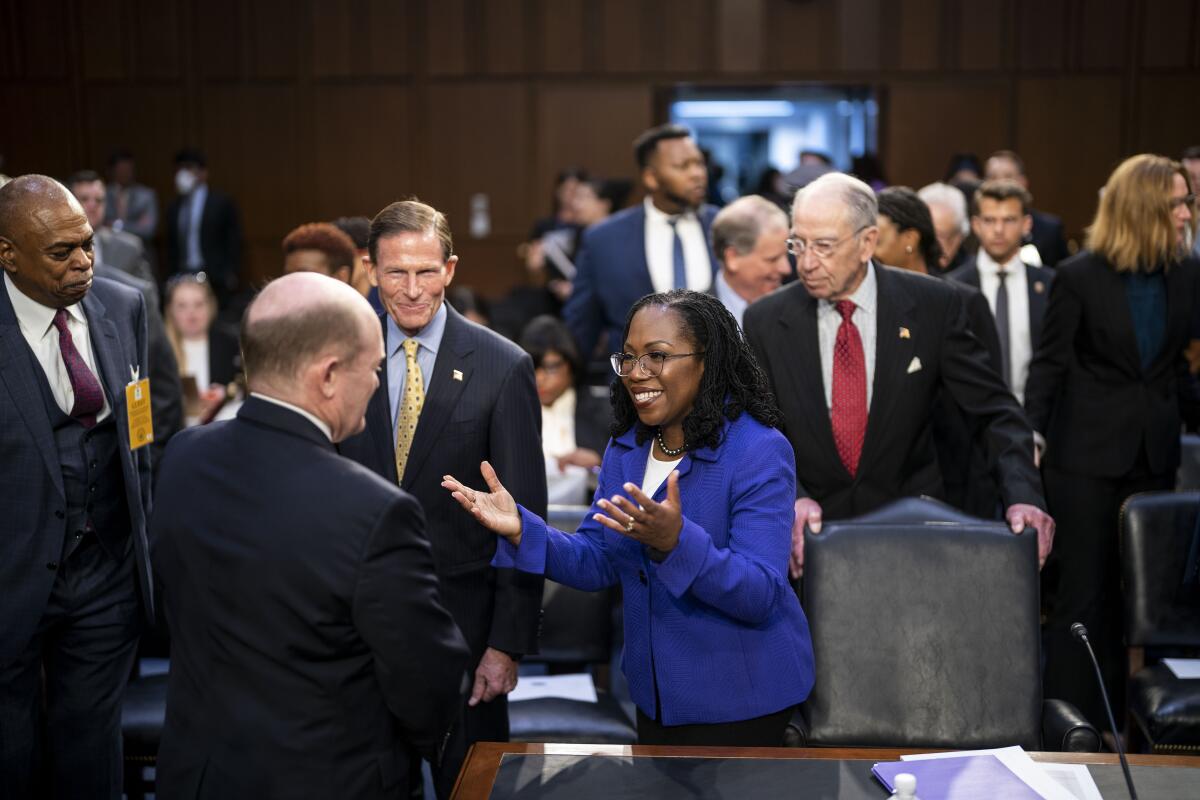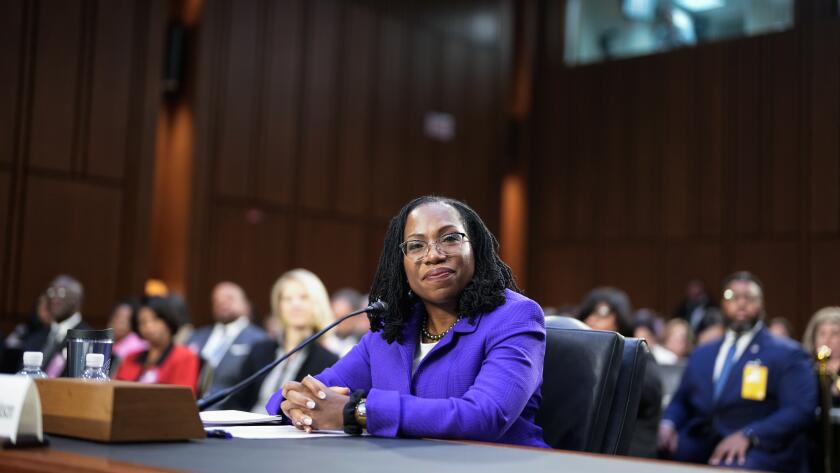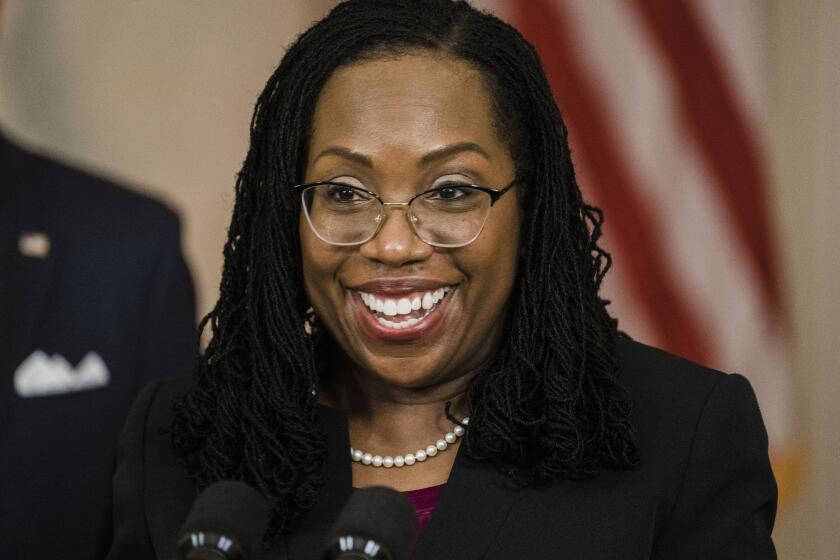Supreme Court nominee Ketanji Jackson vows to defend the Constitution and equal justice under law
President Biden’s nominee, Ketanji Brown Jackson, speaks on the first day of her confirmation hearings before the Senate Judiciary Committee.
WASHINGTON — Judge Ketanji Brown Jackson, President Biden’s historic nominee to the U.S. Supreme Court, promised Monday that if confirmed, she would seek to make the words “equal justice under law” a reality for all Americans.
She called herself an independent jurist who follows the law and pledged to “defend the Constitution and the grand experiment of American democracy that has endured over these past 246 years.”
For the record:
5:04 p.m. March 21, 2022An earlier version of this article incorrectly stated that the White House rejected as “disinformation” Sen. Josh Hawley’s charges that Judge Ketanji Brown Jackson favored lighter prison terms for those convicted of possessing child pornography. The White House called the charges “misinformation.”
Backed by her family and a roomful of supporters, she spoke at the end of the first day of her confirmation hearings before the Senate Judiciary Committee, whose Democrats said they were filled with hope by the nomination of the first Black woman for the post of Supreme Court justice.
“This is a day of joy,” said Sen. Cory Booker (D-N.J.). “This has never happened before. It shows the world the promise of a true democracy.”
After describing himself as the “proud son of immigrants from Mexico,” Sen. Alex Padilla (D-Calif.) said “the men who wrote our founding documents never imagined you could be here.” He added that Jackson’s “appearance here begins a new chapter in American history.”
The Democrats have a majority, but just barely. What that means for Judge Jackson’s confirmation to the Supreme Court.
The Republicans for the most part avoided attacking her directly, but instead faulted Democrats for their harsh treatment of past GOP nominees.
Sen. Charles E. Grassley (R-Iowa) said the Republicans “won’t turn this into a spectacle. We will ask tough questions.”
Sen. Lindsey Graham (R-S.C.) repeated his disappointment that Biden did not select U.S. District Judge J. Michelle Childs from his home state of South Carolina, the candidate Graham said he would have preferred.
The committee is evenly split between 11 Democrats and 11 Republicans, but the tenor of Monday’s hearing suggested her confirmation will not turn into a fierce partisan fight akin to the 2018 battle over now-Justice Brett M. Kavanaugh.
Jackson’s confirmation would not change the ideological balance on the Supreme Court. She would replace liberal Justice Stephen G. Breyer, but conservatives would maintain a 6-3 majority.
Jackson’s friends and supporters described her as smart, open-minded and collegial, and not a partisan ideologue.
Nonetheless, several Republicans served notice that they planned to grill her on Tuesday, when the hearings resume with questioning.
Sens. Josh Hawley (R-Mo.), Ted Cruz (R-Texas), Tom Cotton (R-Ark.) and Marsha Blackburn (R-Tenn.) all suggested Jackson may be soft on crime.
Last week, Hawley said he saw an “alarming pattern” in which Jackson favored lighter prison terms for those convicted of possessing child pornography.

The proper level of punishment for such defendants has been much debated, and the issue came before the U.S. Sentencing Commission, where Jackson served for several years. On Monday, Hawley cited a series of cases where Jackson sentenced a pornography defendant to a lesser prison term than the one recommended by prosecutors.
The White House rejected Hawley’s charges as “misinformation.” And Jackson’s supporters noted that two of her uncles and her brother worked as police officers, and her nomination was endorsed by the Fraternal Order of Police.
Sen. Richard J. Durbin (D-Ill.), chair of the Judiciary Committee, said Republicans frequently raised a “soft on crime” complaint about Democratic nominees, regardless of their record.
“It is a campaign theme for 2022, and it’s played out every time the Judiciary Committee meets considering any nominee,” Durbin said. “I don’t think there’s any credibility to it.”
Since graduating from Harvard Law School in 1996, she has worked steadily as a lawyer. She clerked for three judges, including at the Supreme Court, worked briefly at four law firms, served eight years as a U.S. district judge and one year as a judge on the U.S. Court of Appeals for the District of Columbia Circuit.
But the most cited aspect of her legal career is the two years she spent in the federal public defender’s office in Washington starting in 2005. Attorneys in the office represent people charged with federal offenses, including many of those charged with assault at the U.S. Capitol during the Jan. 6 insurrection last year.
The Democrats have a majority, but just barely. What that means for Judge Jackson’s confirmation to the Supreme Court.
Progressives say her time in that office means she would bring a different perspective to the high court. Since Justice Thurgood Marshall retired in 1991, the court has not had a justice who had represented criminal defendants.
A.J. Kramer, who has headed the public defender’s office in Washington for 30 years, said he assigned cases to attorneys. He said he gave Jackson several of the Guantanamo detention center cases because of her stellar legal background.
“When I looked at her resume, I thought she should be interviewing me, rather than me interviewing her,” he said.
The Bush administration had insisted that the prisoners held at Guantanamo had no rights, but the Supreme Court disagreed and said they may file appeals to federal judges. But even so, the law was unclear and in flux.
Cruz and Cotton signaled they would question Jackson about her representation of Guantanamo prisoners.
In her opening statement, Jackson cited her broad legal experience, including serving as a law clerk to Breyer.
“I have been a judge for nearly a decade now, and I take that responsibility and my duty to be independent very seriously,” she said. “I decide cases from a neutral posture. I evaluate the facts, and I interpret and apply the law to the facts of the case before me, without fear or favor, consistent with my judicial oath.”
She also lauded Breyer as a role model. He “exemplifies what it means to be a Supreme Court justice of the highest level of skill and integrity, civility and grace. It is extremely humbling to be considered for Justice Breyer’s seat, and I know that I could never fill his shoes. But if confirmed, I would hope to carry on his spirit.”

At least three members of the House, Reps. Sheila Jackson Lee (D-Texas), Nikema Williams (D-Ga.) and Lisa Blunt Rochester (D-Del.), attended Monday’s hearing, occasionally capturing the historic moment with pictures and videos on their cellphones.
Guests filled nearly all the available seats in the hearing room, including members of Jackson’s immediate family and her nomination advisors, Doug Jones and Minyon Moore.

In recent years, Senate hearings for Supreme Court nominees have become fiercely partisan. All the committee’s Democrats opposed President Trump’s three nominees, and at times, walked out of the room in protest.
Justice Amy Coney Barrett, confirmed in October 2020, was the first nominee in 150 years to win approval without a single vote from the opposition party.
The committee has not said when it will vote on Jackson’s nomination.
If it divides entirely along partisan lines, Senate Majority Leader Charles E. Schumer (D-N.Y.) can introduce a motion to have her nomination sent to the Senate floor.
More to Read
Get the L.A. Times Politics newsletter
Deeply reported insights into legislation, politics and policy from Sacramento, Washington and beyond. In your inbox three times per week.
You may occasionally receive promotional content from the Los Angeles Times.













